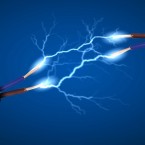Course Code: 4

Department of Electrical Engineering was established in the year 2009, approved by AICTE New Delhi and affiliated to Mumbai University. The department is well established with good number of experienced faculty members. The department moves with a vision to produce competent and disciplined electrical engineers.
Departmental laboratories are spacious and adequately equipped. The various faculties of department have presented/published papers in National/International Conferences and journals. Department is proactive in organizing workshops/seminars in different areas such as Energy management & Audit, SCADA, PLC and HMI. For all round development of students various expert lectures, technical tours, industrial visits are periodically organized. The academic results at various University examinations are excellent, almost 100%.
Department of Electrical Engineering aims to establish a center of excellence in various areas of electrical engineering such as power quality, energy management, audit etc and to offer value added services to industries as well as society.
Vision
-
To aspire for excellence in imparting quality education in the field of Electrical Engineering with an eagerness of developing a professional mindset along with good human values.
Mission
Programme Educational Objectives (PEOs)
Programme Specific Outcomes
Programme Outcomes
Engineering Graduates will be able to:
Apply knowledge of mathematics, science, engineering fundamentals and an engineering specialization to the solution of complex engineering problems.
Identify, formulate, review research literature, and analyze complex engineering problems reaching substantiated conclusions using first principles of mathematics, natural sciences, and engineering sciences.
Design solutions for complex engineering problems and design system components or processes that meet the specified needs with appropriate consideration for the public health and safety, and the cultural, societal, and environmental considerations.
Use research-based knowledge and research methods including design of experiments, analysis and interpretation of data, and synthesis of information to provide valid conclusions.
Create, select and apply appropriate techniques, resources, and modern engineering and IT tools including prediction and modeling to complex engineering activities with an understanding of the limitations.
Apply reasoning informed by the contextual knowledge to assess societal, health, safety, legal and cultural issues and the consequent responsibilities relevant to the professional engineering practice.
understand the impact of the professional engineering solutions in societal and environmental contexts, and demonstrate the knowledge of, and need for sustainable development.
Apply ethical principles and commit to professional ethics and responsibilities and norms of engineering practice.
Function effectively as an individual and as a member or leader in diverse teams, and in multidisciplinary settings.
Communicate effectively on complex engineering activities with the engineering community and with society at large, such as, being able to comprehend and write effective reports and design documentation, make effective presentations, and give and receive clear instructions.
Demonstrate knowledge and understanding of the engineering and management principles and apply these to one’s own work, as a member and leader in a team, to manage projects and in multidisciplinary environments.
Recognize the need for, and have the preparation and ability to engage in independent and life-long learning in the broadest context of technological change.
